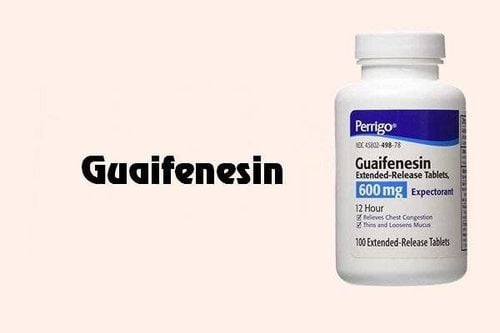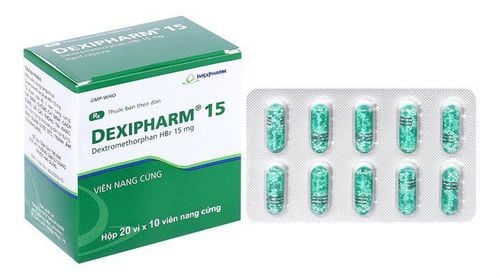This is an automatically translated article.
The main ingredient Acough contains the active ingredient Dextromethorphan HBr with a strength of 15mg. The drug belongs to the group of drugs that act on the respiratory tract. So what is Acough used for and how is it used?1. The effect of the drug Acough
Acough is indicated for the treatment of cough caused by bronchial and pharynx when inhaled irritants or provoked by the common cold, chronic cough, not phlegm.The use of Acough is not indicated in the following cases:
Patients with a history of hypersensitivity to Dextromethorphan or any of the excipients contained in the drug. Patients being treated with monoamine oxidase inhibitors are not indicated to use Acough . Do not use in patients with chronic obstructive pulmonary disease, bronchial asthma or respiratory failure. Do not use Acough in children < 2 years old.
2. Usage and dosage of Acough
Acough is produced in the form of film-coated tablets that should be taken orally. The recommended dose of the drug is as follows:
For adults and children older than 12 years, the dose should be 30mg once (equivalent to 2 Acough tablets), the doses are spaced about 6 to 8 hours apart. In one day, the maximum dose is only 120mg. For children from 6 to 12 years old: 15mg 1 time dose (equivalent to 1 Acough tablet), dose interval from 6 to 8 hours. In a day, only use a maximum dose of 60mg. For children from 2 to 6 years old: a single dose of 7.5mg, dose interval from 6 to 8 hours. In a day, only use a maximum dose of 30mg, should use another form of preparation instead of Acough. When using Acough overdose, patients may experience the following symptoms: blurred vision, vomiting, nausea, drowsiness, nystagmus, coma, urinary retention, hallucinations, respiratory failure, ataxia, convulsions.
It is recommended that patients should report to their doctor immediately when experiencing the above symptoms and need to be transferred immediately to medical centers for treatment, intravenous Naloxon 2mg, can be repeated with a total dose of 10mg.
3. Undesirable effects
When using Acough drug, besides the therapeutic effect, the patient may experience the following undesirable effects:
Common side effects: Fatigue, tachycardia, dizziness, bronchospasm , nausea, skin allergies, skin flushing. Less common side effects: urticaria symptoms. Rare side effects: gastrointestinal disturbances, somnolence.
4. Drug interactions
Symptoms of respiratory depression may occur when CNS depressants are co-administered with Acough, and should be avoided. Monoamine oxidase inhibitors when used together with Acough can cause Serotonin syndrome, not indicated for the use of these drugs. Dextromethorphan concentrations may be increased in serum with an increase in its adverse effects, due to decreased hepatic metabolism of Dextromethorphan when Acough is co-administered with Quinidine. During treatment with Acough, the patient's use of alcohol may increase symptoms of somnolence.
5. Notes when using Acough
Do not use the drug for pregnant women and nursing mothers. Do not use in patients with cough with a lot of phlegm and chronic, persistent cough in smokers, emphysema or bronchial asthma. Patients are advised to discontinue use of the drug if cough persists for more than 7 days, cough with fever and recurrence, persistent headache or rash, which are signs of worsening illness. Use caution when driving or operating machinery.
Please dial HOTLINE for more information or register for an appointment HERE. Download MyVinmec app to make appointments faster and to manage your bookings easily.













